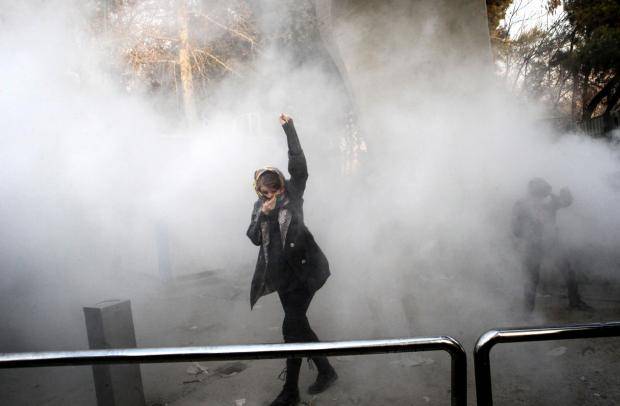For the past five days, Iran has been experiencing country-wide protests. Early reports indicate that the conservative opponents of president Rouhani’s moderate government organized public demonstrations in the city of Mashhad—the second largest city in the country and a prominent destination for Shia pilgrims. The gathering was initially organized to protest high prices, the government’s inability to control inflation, as well as other socioeconomic concerns. However, it soon spread out of control and became much broader in its demands. Some slogans went as far as targeting the Supreme Leader and the Islamic Republic as a whole. The geographical spread and the radical nature of some chants has surprised many, including the country’s political factions. As always, Iran’s forever shifting dynamics has forced the majority of politicians and analysts to take a big juicy bite of humble pie. Some are refusing to eat the proverbial baked good, but the majority of fair-minded observers agree that there are many unknowns at this point and jumping into any broad conclusions is imprudent.
In my humble opinion, there could even be some clarity in uncertainty, so laying out the facts, as best as we can, may shed some light on the situation at hand. The causes of the protests are not monolithic. They range from a broad series of socioeconomic and political concerns—many rooted in the society’s ongoing historic calls for social justice and accountability. The geographic spread is significant, but not necessarily determinative of any additional outcomes. Reports indicate that unrest is dissipating, but the exact trajectory of demonstrators who may not heed the government’s calls for restraint is unclear. It is not evident if this is a movement or just sporadic expressions of rage. There does not appear to be a leader for the protests and no political faction or opposition group (external or internal) has thus far been willing to own them.
Both reformist and conservative wings of Iran’s political factions seem surprised and have yet to land on any coherent approach. In his televised address to the cabinet, President Rouhani recognized the right of people to protest, however he failed to even hint at the institutional constraints and the system’s inability to provide adequate venues for expressing discontent. Conservatives seem to support any calls that suggest Rouhani’s mismanagement of the country’s economy, but are taken back by those who are attacking the Supreme Leader. Reformists who until a few days ago were boasting about their ability to read the pulse of the public are surprised by the extent of the protests and, needless to say, unwilling to support radical demands. In my opinion, these protests will have some ramifications when it comes to the realignment of the position of Iran’s political factions vis-a-vis the issues and their internal dynamics, but the extent of that is unclear as of now.
It is also important to point out that protests in Iran are not unprecedented. The history of the Islamic Republic is fraught with big and small public demonstrations related to the government’s inability to control prices, equal distribution of wealth, lack of social freedoms, human rights, and an array of political issues. Thus far the regime has managed to control public unrest by implementing policy changes or using force when necessary. As of right now, we do not have any indication that would suggest that this time around is anything different. Just to be clear, my aim is not to dismiss public frustrations or belittle people’s genuine demands. As long as public grievances remain and the regime does not provide the necessary outlets for expressing discontent and institutionalizing reform, protests will happen. Though unlikely, we can only hope that this time around regime officials will listen to the calls for justice and implement lasting change.

